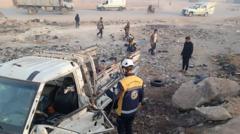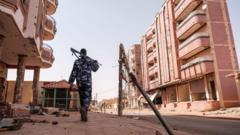Recent reports indicate that Israel has intensified air strikes across Syria, particularly targeting military installations linked to chemical weapon production and Iranian interests, following the recent upheaval in the Assad regime.
Escalating Tensions: Israel Launches Major Air Strikes Across Syria

Escalating Tensions: Israel Launches Major Air Strikes Across Syria
Israeli air operations surge as Damascus faces continued conflict amid regime collapse.
In a significant escalation of military operations, Israeli warplanes have reportedly executed over 100 air strikes across various locations in Syria, including the nation’s capital, Damascus. The UK-based Syrian Observatory for Human Rights (SOHR) has corroborated the extensive scale of these strikes aimed primarily at military targets. Among the hit sites was a research facility suspected of being linked to chemical weapon development, according to local media sources.
Israel has articulated its military actions as a proactive measure to prevent arms from falling into the hands of extremist groups following the collapse of the Assad regime. The recent aggressions coincide with discussions at the UN Security Council regarding the situation in Syria, where members have emphasized the need to maintain Syria’s territorial integrity and provide essential humanitarian aid to civilians caught in the ongoing conflict.
Russian UN Ambassador Vassily Nebenzia remarked on the council’s consensus regarding the necessity to protect civilians, with a focus on securing any chemical weapons in the country. Despite Syria's adherence to the Organisation for the Prohibition of Chemical Weapons (OPCW) Chemical Weapons Convention in 2013, widespread concerns persist about the existence and condition of these stockpiles. Reports indicate that Assad’s government may have failed to adequately declare its chemical arsenal.
The OPCW has underscored the importance of safety regarding chemical weapon materials as it urged Syrian authorities to ensure the security of these facilities in light of the recent assaults. Despite prior destructions of declared chemical stockpiles by the OPCW, reports suggest ongoing use of such weapons, with documented cases exceeding 100 occurrences between 2014 and 2018.
On the operational front, the Israeli military's actions have been marked by crossings from the Israeli-occupied Golan Heights into a demilitarized zone in Syria, which has also raised questions about the status of the region following intensified hostilities in Gaza. Israeli leaders, including Prime Minister Benjamin Netanyahu, maintain that their military strategy aims solely to protect national security interests without involving themselves in Syria's internal affairs.
As rebel forces led by Hayat Tahrir al-Sham (HTS) claim control over Damascus, Prime Minister Netanyahu celebrated the Assad regime's collapse as a pivotal moment for the Middle East. He expressed a willingness to foster peaceful relations with emerging Syrian forces, though cautioned that Israel would act decisively to preserve its security.
The heightened Israeli air activity correlates with extraneous conflicts across the region, particularly the ongoing Israel-Gaza conflict and Hezbollah's involvement. Recent months have seen a noticeable uptick in attacks attributed to Iranian-linked targets, further complicating the already volatile Israeli-Syrian dynamic.
Israel has articulated its military actions as a proactive measure to prevent arms from falling into the hands of extremist groups following the collapse of the Assad regime. The recent aggressions coincide with discussions at the UN Security Council regarding the situation in Syria, where members have emphasized the need to maintain Syria’s territorial integrity and provide essential humanitarian aid to civilians caught in the ongoing conflict.
Russian UN Ambassador Vassily Nebenzia remarked on the council’s consensus regarding the necessity to protect civilians, with a focus on securing any chemical weapons in the country. Despite Syria's adherence to the Organisation for the Prohibition of Chemical Weapons (OPCW) Chemical Weapons Convention in 2013, widespread concerns persist about the existence and condition of these stockpiles. Reports indicate that Assad’s government may have failed to adequately declare its chemical arsenal.
The OPCW has underscored the importance of safety regarding chemical weapon materials as it urged Syrian authorities to ensure the security of these facilities in light of the recent assaults. Despite prior destructions of declared chemical stockpiles by the OPCW, reports suggest ongoing use of such weapons, with documented cases exceeding 100 occurrences between 2014 and 2018.
On the operational front, the Israeli military's actions have been marked by crossings from the Israeli-occupied Golan Heights into a demilitarized zone in Syria, which has also raised questions about the status of the region following intensified hostilities in Gaza. Israeli leaders, including Prime Minister Benjamin Netanyahu, maintain that their military strategy aims solely to protect national security interests without involving themselves in Syria's internal affairs.
As rebel forces led by Hayat Tahrir al-Sham (HTS) claim control over Damascus, Prime Minister Netanyahu celebrated the Assad regime's collapse as a pivotal moment for the Middle East. He expressed a willingness to foster peaceful relations with emerging Syrian forces, though cautioned that Israel would act decisively to preserve its security.
The heightened Israeli air activity correlates with extraneous conflicts across the region, particularly the ongoing Israel-Gaza conflict and Hezbollah's involvement. Recent months have seen a noticeable uptick in attacks attributed to Iranian-linked targets, further complicating the already volatile Israeli-Syrian dynamic.






















